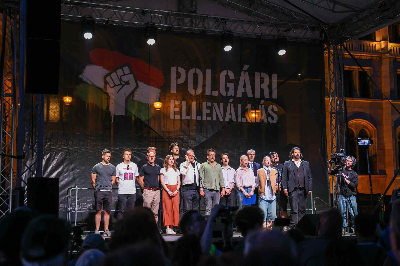
©
У столиці Угорщини Будапешті понад 15 тисяч людей взяли участь в масовій акції протесту проти політики прем’єр-міністра Віктора Орбана. Серед демонстрантів — відомі письменники, актори, журналісти та музиканти. Організатори заявили, що це лише початок широкого руху спротиву проти чинної влади. Основна критика звучала щодо дедалі більш авторитарного стилю управління уряду Орбана. Виступаючі звинувачували його адміністрацію в корупції, яка, за їх словами, збагачує осіб, пов’язаних із провладною партією «Фідес». «Ця країна не належить тим, хто бреше, краде і продав людяність за владу», — заявив письменник Чаба Богош. Він наголосив, що майбутнє належить тим, хто здатен мислити вільно та вірить у спільне, мирне завтра. На площі звучали гасла: «Ні Путіну — ні Орбану!»,"Угорщина - не Росія!" Протестувальники тримали банери з написами "Путін -ні! Європа - так!", демонструючи рішучий спротив орієнтації уряду на російську модель автократії. Причиною протесту стали ухвалені у березні та квітні закони, що фактично забороняють публічні заходи ЛГБТК+ спільнот та дозволяють застосовувати технології розпізнавання облич для ідентифікації та штрафування учасників «незаконних» зібрань. Критики вважають, що ці заходи відображають репресивну політику Кремля.
15,000 Protesters Rally Against Orban’s Regime in Budapest
Over 15,000 people took to the streets of Hungary’s capital, Budapest, to protest against the policies of Prime Minister Viktor Orban. Among the demonstrators were well-known writers, actors, journalists, and musicians. Organizers declared the rally as the beginning of a broad resistance movement against the current government. Much of the criticism focused on the increasingly authoritarian direction of Orban’s administration. Speakers accused the government of systemic corruption that enriches individuals connected to the ruling Fidesz party. "This country does not belong to those who lie, steal, and sell their humanity for power," said writer Csaba Bogos. He emphasized that the future belongs to those who dare to think freely and believe in a shared, peaceful tomorrow. Protesters chanted slogans such as "No to Putin — No to Orban!", "Hungary is not Russia!", and "Russia, go home!". Banners reading "Say No to Putin — Say Yes to Europe!" highlighted the public’s strong rejection of the government’s drift toward a Russian-style autocracy. The demonstration was sparked by legislation passed in March and April that effectively bans public LGBTQ+ events and authorizes the use of facial recognition technology to identify and fine participants at so-called “illegal” gatherings. Critics say these measures reflect the repressive policies of the Kremlin
1393